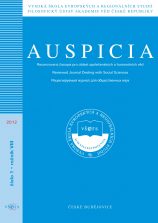Spor o Aristotela a Tomáše Akvinského na středověkých univerzitách
Diispute on Aristotle and Thomas Aquinas at medieval universities
Author(s): Jiří BílýSubject(s): Christian Theology and Religion, History of Church(es), Political Philosophy, Political Theory, Philosophy of Law, Politics and law, Roman law
Published by: Vysoká škola evropských a regionálních studií, z. ú.
Keywords: political thinking; Roman law; institutions; church; papacy;
Summary/Abstract: When Latin translations of Greek texts of Aristotle’s Ethics and Politics occurred in the 13th century, they overshadowed natural philosophy in Western Europe. Even when Aristotle’s works on natural philosophy had spread widely in Latin translations in the mid-twelfth century before, theologians and lawyers viewed nature as a normative power. Writers in the 12th century created philosophical systems in which the influence of natural forces and the natural law played a significant role. Many Latin translations made in the 12th century, dealing with medicine, astrology, magic and alchemy written by authors such as Ptolemy, Galen, Albumasar, Ibn Sina, Al-Fārābī, Alfarghani, and others who were anonymous or pseudonymous, represent a remarkable surge of curiosity about such matters which was rational in its objectives. In addition, in the Christian tradition, Aristotle´s and Avicenna´s works influenced Thomas Aquinas. Thomas Aquinas also emphasised the necessity and the naturalness of monarchical reign. The opening paragraphs of his De regimine principum describe man as a social and political animal‘ whose natural and necessary state is to live in a society of many similar creatures‘, the ideas ensuing from Aristotle. The ideas of Aristotle and Aquinas resembled each other. The mutual influence of the two systems is a topic of this article.
Journal: Auspicia
- Issue Year: 2020
- Issue No: 1
- Page Range: 25-43
- Page Count: 19
- Language: Czech

